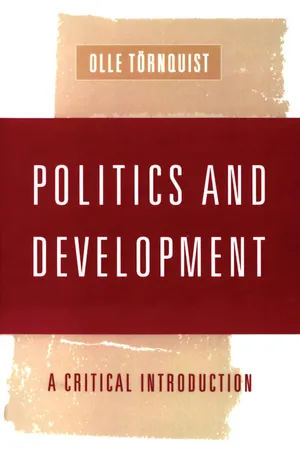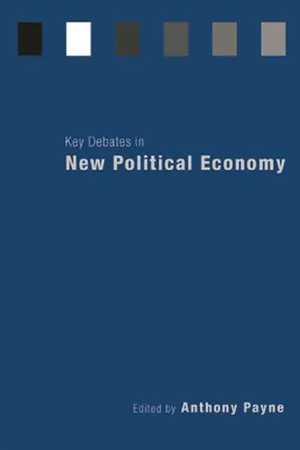Politics & International Relations
Models of Development
Models of development refer to theoretical frameworks used to understand and analyze the process of economic, social, and political advancement within societies. These models can include modernization theory, dependency theory, and world-systems theory, each offering distinct perspectives on the factors and dynamics that drive development. They are often used to inform policies and strategies aimed at promoting growth and progress in different parts of the world.
Written by Perlego with AI-assistance
Related key terms
3 Key excerpts on "Models of Development"
- eBook - ePub
Politics and Development
A Critical Introduction
- Olle Törnquist(Author)
- 1998(Publication Date)
- SAGE Publications Ltd(Publisher)
The argument implied in this more serious objection is that most theories of development, within which we are supposed to set our studies of the role of politics, give little room for qualified in depth study of the particular dynamics and importance of politics – including administration and forms of government, institutions and organisations, ideologies and discourses, policies and strategies. The most frequently given examples are the ‘old’ socio-economically oriented theories of modernisation and dependency, 17 but one may just as well refer to the currently more fashionable attempts at building an alternative theory for ‘another development’, within which politics is not only opposed to civil society but often even seen as ‘part of the problem’. 18 Politics and Late Development The major problems with the frameworks delineated so far are thus: that studies of political development lack sufficient empirical foundation in the Third World, tend to uncritically apply Western norms, and tend also to focus on the level of the ‘national’ elite; that attempts at providing this missing empirical foundation through explorations and descriptions of Third World politics run the risk of being particularistic; that both these frameworks have politics rather than problems of development as their point of departure; that interdisciplinary analyses of the politics of development, first (just like studies of political development), often apply Eurocentric grand theories and, even more serious, lack a theoretical format giving due space to the importance of politics. Many of these problems may be tackled, I would argue, by going beyond the old frameworks to identify and combine, instead, their advantages. Students of politics who share a serious (but not necessarily primary) interest in problems of development should thus be able to carve out a new subdiscipline within political science which, for short, may be labelled ‘politics and development’ - eBook - ePub
Poverty Amidst Plenty
World Political Economy And Distributive Justice
- Edward Weisband(Author)
- 2019(Publication Date)
- Routledge(Publisher)
Such observations are often accompanied by the notion that class formation occurs downward. The state provides the organizational foundation any class needs to move from being a “class-in-itself” (a group with identifiable common interests, problems, and values) to a “class-for-itself” (a group that has recognized such community and has started to create collective organizations). Therefore, class formation has proceeded more rapidly within the elite than among the peasants and workers, who are dispersed and lack such an organization ready to hand. The state, then, can be regarded as “a preformed class organization in waiting”: “There was thus [at independence] no need for those at the upper levels of society to constitute an organization to represent their class interests—they had the State.” The externalist (capital logic) perspective and the internalist (class logic) perspective are not altogether mutually exclusive. They do, nonetheless, constitute distinct ways of dealing with two sets of questions to which a Marxist approach to international political economy gives rise. One set concerns the relationship between international capitalism and the Third World state: is the latter merely a tool of the former, or does it enjoy relative autonomy? The other set concerns the relationship between the state and domestic interests: is this relationship shaped by the exigencies of international capitalism, or is it subject to dynamics that are local in origin, perhaps involving forces other than those generated by capitalism? Are the external imperatives of economic power congruent with the internal imperatives of getting and holding onto power, or may these two sometimes conflict?Reading #16 Models of Development and Social ChangePaul SteidlmeierWhat developmental programs should states select, assuming that governments are able to implement policy strategies for autonomous development? How do policy strategies differ, and which among them most effectively incorporate the norms of distributive justice? Paul Steidlmeier, in this final reading of Part One , surveys the entire range of policy strategies available to lesser developing countries in contemporary society; he also assesses their value-assumptions and developmental impacts.He begins by encapsulating the plight of poverty-stricken countries in terms of the dilemmas created by the world food complex. He then proceeds to describe six development policy strategies: growth, revolutionary, redistribution with growth, basic needs, self-reliance and popular participation, and integrated rural development strategies.The distinctions among these strategies relate to the questions raised earlier regarding class, capital, the nature of economic growth and social development, and the autonomy of states. For Steidlmeier, authentic social development ultimately depends upon what people do for themselves and the extent to which political and economic structures allow the creative energies of citizens to function freely. Where economic growth impedes distributive justice, however, Steidlmeier recommends leaning hard in favor of equity—even ot the price of slower growth. For this reason, he manifestly prefers policy strategies that emphasize self-reliance and integrated rural development. - eBook - ePub
- Anthony Payne(Author)
- 2006(Publication Date)
- Routledge(Publisher)
6 (not to mention the political and security angles of this) has led to a healthy recognition of the centrality of institutions and governance for developmental purposes, and the beginning of a realisation that politics is fundamental in shaping both.Thus, although there were some very important contributions in the 1980s and early 1990s which stressed the salience of politics and the state in achieving successful policy reform and structural adjustment,7 the general picture was one in which the political and social contexts and conditions of development were sidelined. So it is fascinating to see that the importance of this wider institutional and historical context (as urged in the first editorial of New Political Economy in 19968 ) has again, in the first decade of the twentyfirst century, come to be recognised as absolutely central. And not before time. It is also worth noting that this renewed institutional interest has come from scholars (often working within, with or parallel to, development agencies, such as the World Bank) who might be thought to have been least sympathetic to such a wider social scientific approach to the problems of development and most sympathetic to what Albert Hirschman referred to as a ‘mono-economics’ or ‘the orthodox position’.9 This mono-economics has been based on what Kenny and Williams have recently described, appropriately, as an epistemological and ontological universalism which holds that ‘all economies are in some way the same, and hence that economies and economic processes are comparable’, thus giving rise to the presumption of laws that operate across all economies in space and time, irrespective of the wider sociopolitical context.10 Better still is the description of that approach as a kind of ‘property rights reductionism – one that views the formal institutions of property rights protection as the end-all of development policy’.11
Learn about this page
Index pages curate the most relevant extracts from our library of academic textbooks. They’ve been created using an in-house natural language model (NLM), each adding context and meaning to key research topics.


